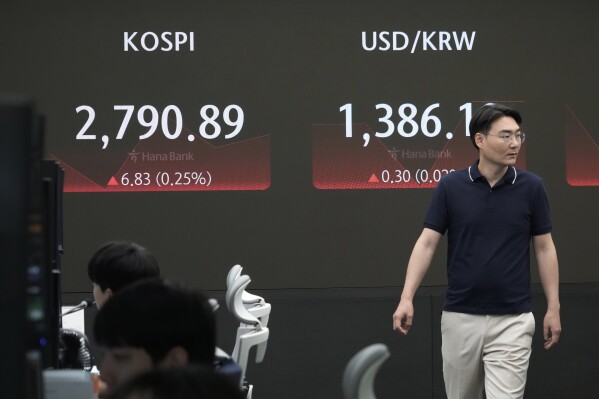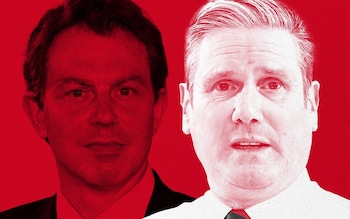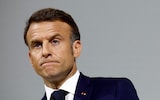Jordan Bardella, the fresh-faced 28-year-old who could be the first French prime minister for Marine Le Pen’s far-Right National Rally party, has designs on EU cash.
Bardella, the president of National Rally, is eyeing up the money that Paris sends to Brussels. He wants to cut France’s contribution to the EU’s budget by between €2bn and €3bn (£2.5bn), keeping the money in Paris.
Such funds would be valuable.
It is no coincidence that Bardella highlighted the money-saving plan just days after the European Commission told France to get its finances in line. The country’s deficit is expected to top 5pc of GDP this year and France’s total borrowings are 110pc the size of the economy’s annual output.
France has been placed into the Excessive Deficit Procedure, under which the EU monitors borrowing and proposes ways to cut the state’s deficit back down to the maximum allowed level of 3pc of GDP. If it fails to do so, the French government could be fined by the EU.
France has been ordered to save money – but Brussel perhaps did not expect Bardella to reach into the EU’s own budget to do so.
“The less we give to the EU, the more we can forward money to the real French economy,” he said last week.
With National Rally riding high in the polls ahead of the snap election, such statements are more than idle talk.
Le Pen, the power behind the throne, has long been sceptical of the EU too. She no longer advocates leaving the single currency but is still politically very far away from President Emmanuel Macron, who has been a key advocate for more European unity.
Leo Barincou at Oxford Economics says Le Pen’s party is “very much critical of all things coming from Brussels or going to Brussels in the case of money”.
Financial markets have been spooked by the prospect of National Rally gaining a degree of power, with government borrowing costs spiking in recent weeks.
Even before proposing a raid on the EU’s budget National Rally were proposing a loosening of the public purse strings, potentially adding to the nation’s already large debt.
“They want to cut taxes and spend more, but they are lacking additional revenues, so if they can find some money in lesser contributions to the EU, it would be welcome,” says Barincou.
The country is set to pay €21.6bn to Brussels this year, making it the second-largest contributor to the €189.4bn budget.
However, achieving cuts to the EU budget contributions may prove easier said than done.
“They can’t do it,” says Iain Begg, a professor at the London School of Economics’ European Institute. “Legally, it’s virtually impossible.”
France, like other member states, has committed to paying into the European budget through a policy called the EU’s own resources decision. Changing this amount requires the consent of the other 26 countries in the union.
“They would face an immediate sanction from a case being put in the European Court of Justice, which would find France very rapidly in breach of its obligations,” says Begg.
“The equivalent would be Westminster unilaterally saying: ‘We are no longer going to fund Scotland.’ It would create such a hoo-ha that you just cannot envisage it happening.”
Erik-Jan van Harn at Rabobank agrees: “Every member state needs to agree on a potential rebate, so the chances of France actually getting a rebate are pretty small.”
However, van Harn believes a grand failure on the EU stage could in fact work to Bardella’s advantage.

“I have a feeling it is more for domestic politics. If they get the rebate from Brussels, they can sell it as a win at home and say they stepped up against the bureaucrats in Brussels.
“But if it does not work out, they can say the bureaucrats blocked us and are not supporting the will of the people.”
Begg adds: “If by some maverick process Bardella managed to suspend France’s payments to the European budget, a logical thing for the EU authorities to do would be to say ‘right, in that case we suspend payments to French farmers’.
“This would be so dramatic that it would potentially go in the direction of breaking up the EU.”
However, it may not even progress that far. While Macron faces a humbling in the election, he will still wield considerable power and could block Bardella.
“Even reduced as Macron is in power, he can fire the prime minister the day after he appoints him if he comes up with some crackpot idea like that,” says Begg.
Bardella and Le Pen have sought to reassure investors that they can be trusted with public finances. Sending borrowing rates spiralling in financial markets would do them few favours in office.
Blowing up the EU’s budget or ignoring Brussels’ would imperil this effort to win over investors.
Pushing back against Brussels’ rules in a spirit of opposition, rather than of compromise, would likely push the EU to take a strict line, potentially including a fine under the Excessive Deficit Procedure.
That will worry markets more, says Holger Schmieding, economist at Berenberg Bank. The bigger the bust-up with the EU, the less the pair will be seen as trustworthy and the higher borrowing costs will rise.
“Brussels cannot change French fiscal policy and fines are a way off, but this threat would become more serious. We would likely see bond markets reacting to these risks,” he says.
“France would probably lose more through higher financing costs than it could gain from a budget rebate from the EU if it tries to force this rebate with a noisy, controversial debate.”
Bruno Le Maire, Macron’s finance minister, has warned of a “Liz Truss scenario” if National Rally gains control of public finances – referencing the bond market snarl-up that brought down the former prime minister.
A financial crisis in France would be felt beyond its borders. The Bank of England on Thursday warned of growing risks from a combination of political uncertainty and enormous government debts. Its warning was broad, but the Bank singled out France as a particular worry.
A sharp rise in French borrowing costs could quickly wash over the Channel into the finances of indebted British businesses and families.
As Bardella and Le Pen prepare for a clash with Brussels, danger lies on all sides.
Disclaimer: The copyright of this article belongs to the original author. Reposting this article is solely for the purpose of information dissemination and does not constitute any investment advice. If there is any infringement, please contact us immediately. We will make corrections or deletions as necessary. Thank you.



